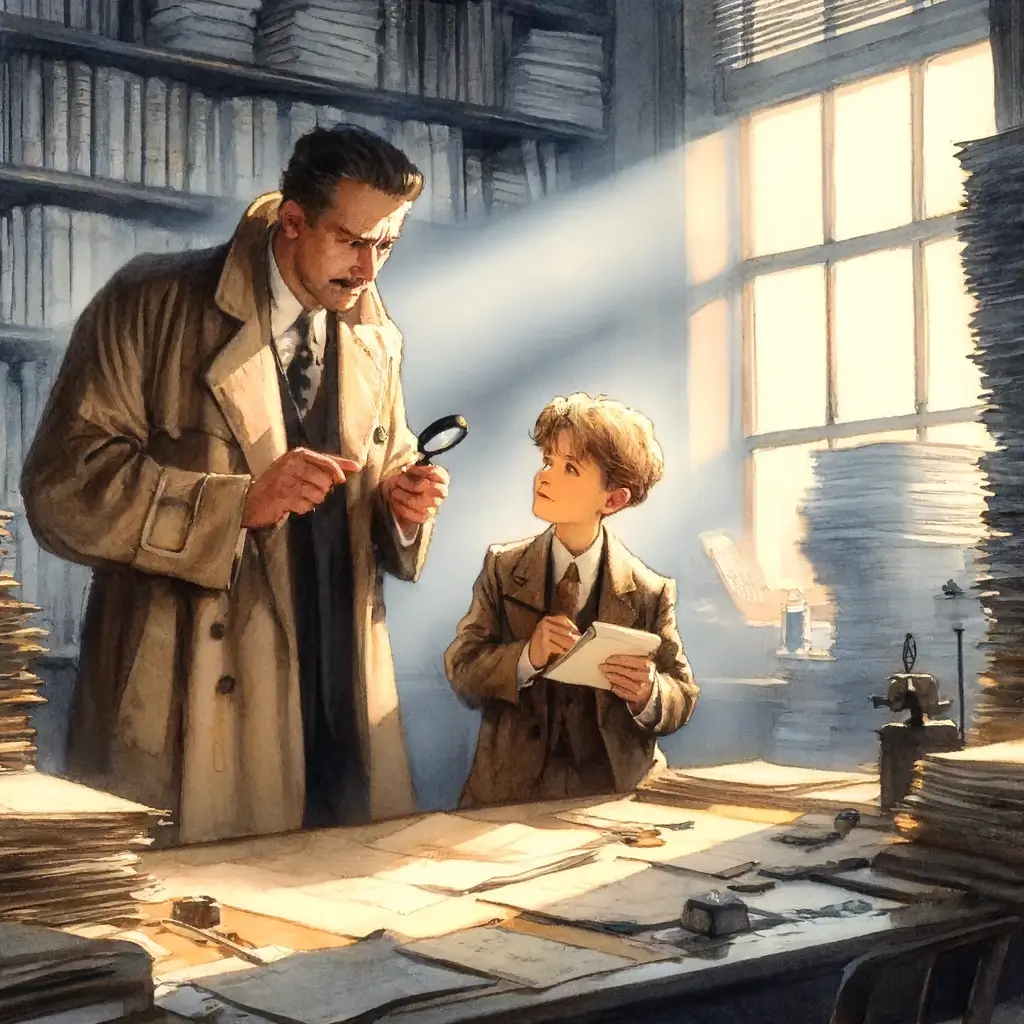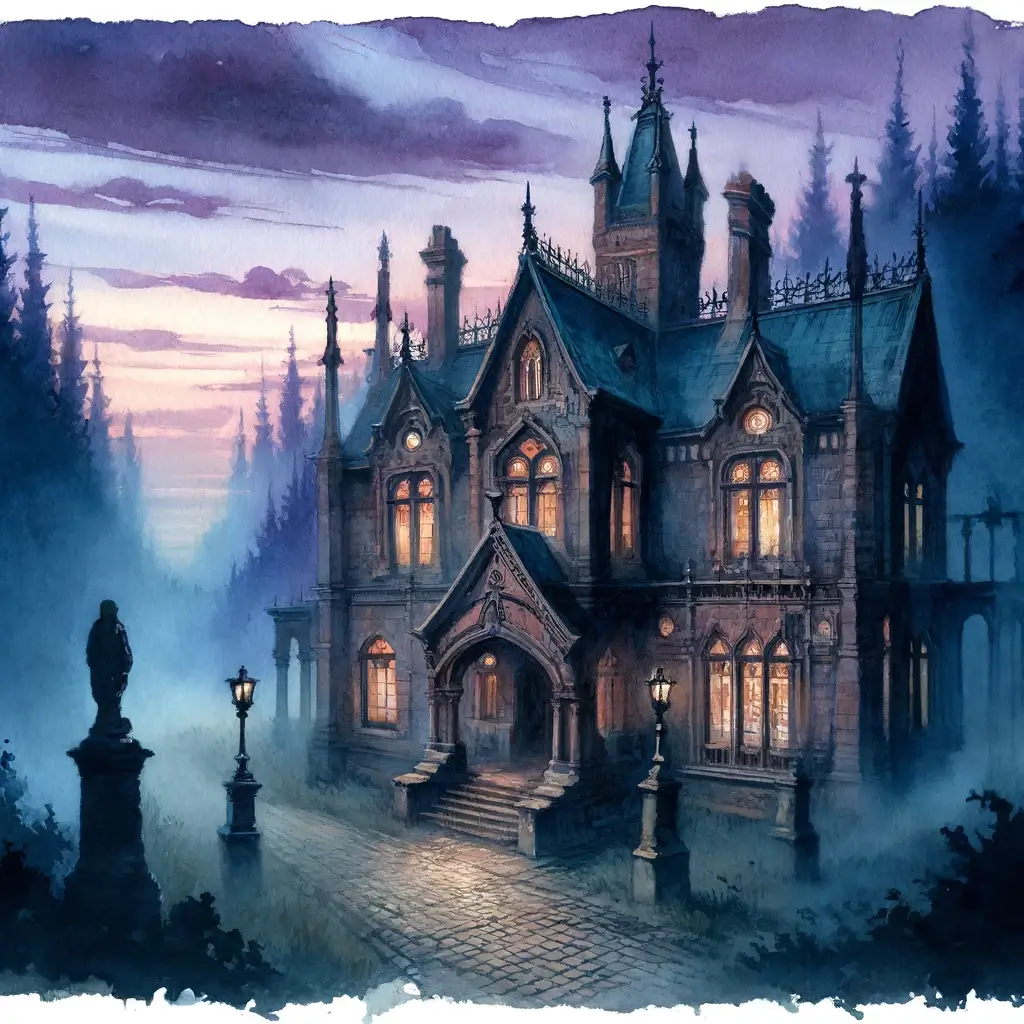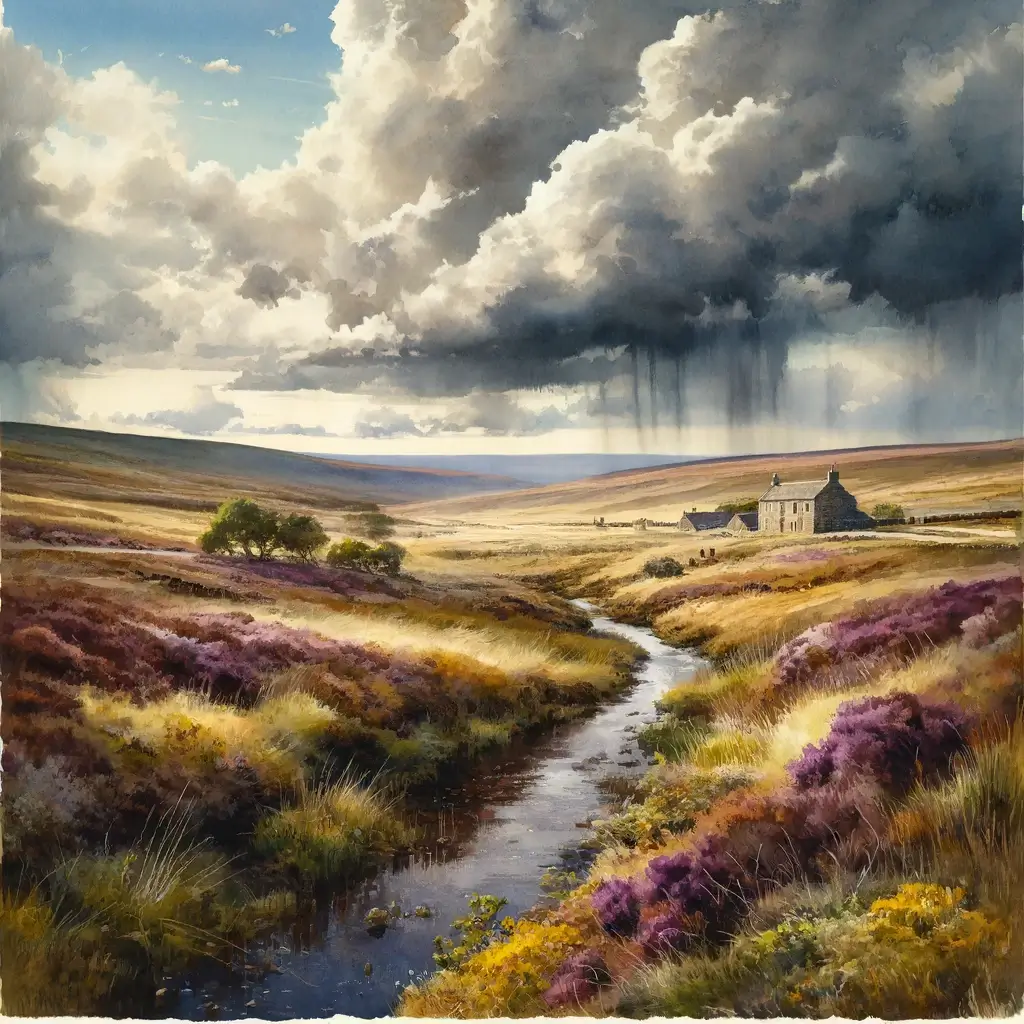
A watercolor painting depicting a scene where a seasoned detective and his eager young assistant are standing in a dimly lit, cluttered office. The detective, a man with a sharp eye and a trench coat, is examining a piece of evidence with a magnifying glass. His assistant, a curious and bright-eyed individual with a notepad in hand, looks on intently, ready to jot down any observations. The office is filled with towering stacks of files, a large, old-fashioned wooden desk cluttered with papers, and a single window that lets in a sliver of light, casting long shadows across the room. The atmosphere is thick with mystery and the anticipation of solving a challenging case. The watercolor style adds a softness to the scene, with blurred edges and a palette of muted colors that evoke a sense of the past.
Webber: Alice, as we approach our client's residence by train, I've been piecing together the preliminary information. It seems this case may very well revolve around the disappearance of some valuable jewels.
Alice: Indeed, Webber. The details provided suggest a complex puzzle. It's imperative we analyze every—Oh dear!
The train jolts, causing Alice's tea to spill.
Webber: Not to worry, Alice. I'll have the attendant take care of this. Excuse me, could we have some assistance here? And, could you please bring us a steak, a sandwich, a baked potato, and a milk tea? Alice, would you like anything else at the moment?
Alice: Just a replacement for my tea, thank you. And Webber, are you certain about the expenses for this journey?
Webber: Absolutely, Alice. Our client has agreed to cover all costs. Feel free to order anything else you might fancy.
Alice, with a relieved smile: In that case, I'd like to add a lobster sandwich and a grilled lamb chop to our order, please.
After the meals are served, Webber notices something peculiar about the server.
Webber: Alice, did you observe our server's behavior? It was peculiar, almost as if he was overly interested in our conversation.
Alice: Yes, I did notice. Perhaps our investigation should commence a bit sooner than anticipated, right here on this train journey.
Webber: Precisely my thought. Let's stay observant and see where this unexpected start leads us.

Webber: Alright, Alice, to keep our minds sharp, let me propose a riddle for you. It's a classic, yet always a good test of logic. 'I speak without a mouth and hear without ears. I have no body, but I come alive with wind. What am I?'
Alice, pondering for a moment: Hmm, that's a thoughtful one. But I believe the answer is 'an echo'. It fits all the criteria of your riddle.
Webber, with a nod of approval: Precisely, Alice. An echo indeed. It seems your analytical skills are as keen as ever. These sorts of exercises are perfect for keeping our detective instincts in tune.
Alice: I agree, Webber. Such puzzles not only entertain but also sharpen our capacity for lateral thinking. Do you have another riddle for me, or shall I challenge you with one this time?
Webber: I'd like to hear what you have in mind, Alice. Please, challenge me.
Alice thinks for a moment before posing her riddle.
Alice: This one is a bit of a classic too. 'Forward I am heavy, but backward I am not. What am I?'
Webber strokes his chin, lost in thought for a brief moment.
Webber: Ah, the answer to that is 'ton'. Forward it spells 'ton', which is heavy, but backward it spells 'not'. A clever play on words, Alice.
Alice: Well solved, Webber. It's clear our journey to the client's residence won't just be about the case at hand but also a journey of keeping our wits sharpened.
Webber: Indeed, Alice. A detective's mind must always be as keen as their observational skills. Now, let's keep our eyes open and minds alert. Our mysterious server might just be the beginning of this intricate case.
Webber, lifting their luggage with ease: Well, Alice, we've arrived. Let's make our way to the client's estate. I believe it's not too far from here.
Alice, unfolding a map and scanning it quickly: Yes, it appears to be a straightforward route. The estate is situated on the outskirts of this quaint little town. It looks like we’ll be passing through some picturesque countryside along the way.
As they walk, the lush landscape around them unfolds in a tapestry of colors and sounds, a stark contrast to the industrial hum of the city they had left behind.
Webber: I must say, the scenery here is quite breathtaking. It’s moments like these that remind me why I enjoy our fieldwork so much.
Alice, with a smile: Indeed, the fresh air, the serene landscape—it’s a welcome change from the usual hustle and bustle. Look at that old bridge over there, Webber. It’s like something out of a painting.
Webber: Absolutely, Alice. And observe how the river beneath it flows so calmly, reflecting the sky. It's a perfect moment to not only appreciate nature but also to clear our minds before diving into the complexities of our case.
They continue to converse lightly, discussing everything from the architectural styles of the buildings they pass to the varieties of flowers that bloom along the roadside. Their journey is as much about reconnecting with the world outside as it is about reaching their destination.
Alice: This environment is so different from where we usually find ourselves. It’s peaceful yet somehow invigorating. It’s as if the very air is charged with a sense of mystery and anticipation.
Webber: Well observed, Alice. A detective's life is indeed filled with contrasts. From the gritty to the grand, the perilous to the peaceful. Each case brings its own unique flavor to our experiences.
As they approach the client's estate, the conversation shifts back to the case at hand, but the brief interlude of tranquility has given them a renewed perspective and vigor.
Webber: We’re almost there, Alice. Ready to tackle whatever lies ahead with a fresh mind and keen eyes.
Alice: Absolutely, Webber. Let’s solve this mystery and maybe, just maybe, find time to enjoy more of this stunning scenery.

Webber, picking up the note: Look at this, Alice. 'My jewels have disappeared, please help me find them.' No signature, no further instructions. Just this plea for help.
Alice, looking around cautiously: It’s strange, isn’t it? To come all this way and be greeted by nothing but silence and this note. The atmosphere is... unsettling.
Webber: Indeed. But let's not allow the ambiance to distract us. This note is our first real clue. The fact that there's no one here to meet us suggests a level of urgency or perhaps fear. Our client might be in hiding or unable to reach us for some reason.
Alice: So, where do we begin? This estate is vast, and without any direct leads, we could be looking for a needle in a haystack.
Webber, examining their surroundings: First, we secure this note as evidence. Then, we must conduct a thorough examination of the estate. Every room, every corner might hold a clue leading us to the missing jewels. We should also look for any signs of forced entry or disturbance. It’s possible the thief left a trail we can follow.
Alice: We should also try to access any security footage the estate might have. And, perhaps speaking to the staff could shed some light on recent events or visitors.
Webber: Absolutely, Alice. Let’s split up to cover more ground. I’ll take the east wing, you take the west. We meet back here in one hour. Keep your eyes open for anything out of the ordinary and stay in touch via radio.
Alice: Got it. And Webber, let’s be cautious. Whoever took the jewels might still be lurking around. We don’t yet know what we’re dealing with.
Webber: Agreed. Let’s proceed with the utmost caution. The mystery of the missing jewels and the absence of our client has just deepened. It's up to us to unravel this puzzle.

Webber, holding the note found alongside the discovered jewels: This is most peculiar, Alice. 'These jewels are your reward for completing the task. Look forward to my next commission.' No signature, no trace of either our client or the thief. It's as if the entire case was a test designed for us.
Alice, examining the jewels: A test, perhaps, or maybe a game? This entire scenario has been unorthodox from the start. But here we are, with the missing jewels in hand and no one to return them to. What should we do with these?
Webber: First, we document everything. We'll need to report our findings, including this note and the location of the jewels. As for the jewels themselves, without a client to claim them, they should be turned over to the authorities. It’s the lawful and proper course of action.
Alice: I agree. Yet, I can't help but feel intrigued. The message implies there will be more 'commissions' in the future. It seems we’ve caught the attention of someone quite enigmatic.
Webber: Indeed. It’s a reminder that our work often intersects with the unknown and the unexpected. For now, let's secure the jewels and prepare our report. We'll hand everything over to the police and let them handle it from here. Our role in this mystery ends with ensuring the jewels are safe.
Alice: And what about the client, if they ever truly were in need? This whole venture might have been an elaborate ruse, but it’s also possible they’re out there, watching our every move.
Webber: That’s a possibility we cannot ignore. We must remain vigilant. For now, though, our priority is to conclude this case responsibly. Let's head back to the office and organize our findings. This case may be over, but the experience has provided us with valuable insights and, potentially, a new adversary.
Alice: Or a benefactor, depending on their intentions. Either way, it’s clear our adventures are far from over, Webber.
Webber: Precisely, Alice. Let's return to the detective agency. We have a lot to discuss and even more to prepare for. The path of a detective is never dull, especially with such cryptic challenges laid before us.
Themes and Motifs
What are the prevalent themes in detective novels, and how do they reflect societal concerns?
Character Development
How does the detective's character evolve throughout the novel, and what drives this evolution?
Narrative Structure
How does the narrative structure of detective novels affect the suspense and resolution of the plot?
Role of Setting
In what ways does the setting influence the plot and characters in detective novels?
Moral and Ethical Quandaries
What moral dilemmas are commonly faced by detectives in these novels, and how are they resolved?
Influence of the Author’s Background
How does the author's personal history and perspective shape the narrative and themes of detective novels?
Historical and Cultural Context
How do detective novels reflect the historical and cultural context in which they were written?
Techniques of Mystery and Suspense
What literary techniques are most effective in creating mystery and suspense in detective novels?
Evolution of the Genre
How has the detective novel genre evolved over time, and what factors have driven these changes?
Comparative Analysis
How do detective novels differ across cultures, and what do these differences reveal about societal values and fears?
Themes and Motifs
How does Agatha Christie use the isolated setting motif in "And Then There Were None" to enhance the novel's suspense?
Character Development
In "Sherlock Holmes," how does Arthur Conan Doyle develop Holmes' character through his interactions with Dr. Watson?
Narrative Structure
Analyze the use of non-linear narrative in "The Girl with the Dragon Tattoo" and its effect on the reader's understanding of the mystery.
Role of Setting
Discuss the significance of the foggy London streets in creating an atmosphere of mystery in "The Hound of the Baskervilles."
Moral and Ethical Quandaries
Explore the ethical implications of Hercule Poirot's decision-making in "Murder on the Orient Express."
Influence of the Author’s Background
Examine how Raymond Chandler's experience in the oil industry influenced the gritty realism of "The Big Sleep."
Historical and Cultural Context
How do the detective novels of the Golden Age reflect the social anxieties of the interwar period?
Techniques of Mystery and Suspense
What role does the unreliable narrator play in creating suspense in "Gone Girl" by Gillian Flynn?
Evolution of the Genre
Trace the evolution of the detective genre from Arthur Conan Doyle's Sherlock Holmes to contemporary detective stories.
Comparative Analysis
Compare the portrayal of detectives in British detective novels with those in Japanese detective novels, focusing on cultural influences on the detective archetype.
In the misty avenues of a bustling city, Detective Webber and his astute assistant, Alice, found themselves embroiled in a case unlike any other. It all began with a peculiar receipt, crumpled and discarded, yet holding secrets untold.
The receipt, from a local grocery store, listed ingredients not commonly purchased together: an assortment of spices for curry rice alongside various items for a hot pot. It struck Webber as odd — why would someone buy ingredients for such distinct dishes in one go? The detective, known for his sharp intellect, sensed a deeper story.
"Think about it, Alice," Webber mused, tapping the receipt with a finger. "This isn't just someone planning a diverse menu. The quantity of spices... the specific items for hot pot... It's almost as if they're catering to a very specific group of people."
Alice, ever the perfect complement to Webber's methods, started cross-referencing the ingredients with local communities. "If we consider the cultural significance of these dishes, perhaps our suspect is trying to bring together a diverse group. Maybe an event?"
Their investigation led them to a quaint neighborhood known for its cultural diversity. The duo discreetly inquired at local eateries and community centers, piecing together whispers of an upcoming, undisclosed gathering meant to bridge communities through food.
A breakthrough came when they discovered a local chef, renowned for her culinary prowess in both dishes, had recently gone missing. "It's not just about the food," Webber realized. "It's a message. A plea for unity, perhaps? Or something more?"
The night of the gathering, Webber and Alice, blending into the shadows, watched as diverse groups came together, laughter and aromatic scents filling the air. But amidst the joy, a tension simmered — the chef was there, not missing by chance but by choice, orchestrating a culinary marvel to unite feuding factions within the community.
As the evening waned, Webber and Alice approached the chef, revealing their understanding of her intentions. "Food has a power beyond sustenance," the chef shared. "In its essence, it can heal, unite, and bridge the deepest of divides."
The case of the culinary clue was closed, but for Webber and Alice, the experience was a reminder of the profound impact of empathy and understanding. Through the lens of a detective, they had uncovered not just the truth behind a gathering but the recipe for community harmony.
In many detective novels, the protagonist is a __________ detective, who solves mysteries through keen observation and logical deduction.
The __________ motive is a frequently explored theme in detective stories, often driving the plot and the investigation.
__________ Holmes is one of the most iconic characters in detective fiction, created by Sir Arthur Conan Doyle.
Agatha Christie's character, __________ Poirot, is a Belgian detective known for using his "little grey cells" to solve complex cases.
The term "whodunit" refers to a mystery where the plot revolves around discovering the __________ of a crime.
__________ is often considered the birthplace of the classic detective story, with Edgar Allan Poe's work significantly contributing to the genre.
A common feature in detective novels is the "red __________," a clue or piece of information meant to mislead or distract the reader from the actual culprit.
The __________ room mystery is a subgenre of detective fiction where a crime, usually murder, is committed under seemingly impossible circumstances.
__________ Chandler, a key figure in developing the hard-boiled detective genre, created the character Philip Marlowe.
In detective fiction, the __________ is the solution to the mystery, typically revealed in the climax of the story.
private
murder
Sherlock
Hercule
perpetrator
America
herring
locked
Raymond
denouement